#history
-
 November 20, 2023The bibliographic collections of Claudio Cesa and Enzo Collotti, a mirror of a European Weltanschauung2023 was an important year for acquisitions at Fondazione Bruno Kessler's Library, which is increasingly being characterized as a specialized library with a significant presence of personal fonds.
November 20, 2023The bibliographic collections of Claudio Cesa and Enzo Collotti, a mirror of a European Weltanschauung2023 was an important year for acquisitions at Fondazione Bruno Kessler's Library, which is increasingly being characterized as a specialized library with a significant presence of personal fonds. -
 November 15, 2023The interdisciplinarity of environmental historyWe open the FBK Dictionary column with this article on environmental history, an innovative line of research that is very active at FBK-ISIG.
November 15, 2023The interdisciplinarity of environmental historyWe open the FBK Dictionary column with this article on environmental history, an innovative line of research that is very active at FBK-ISIG. -
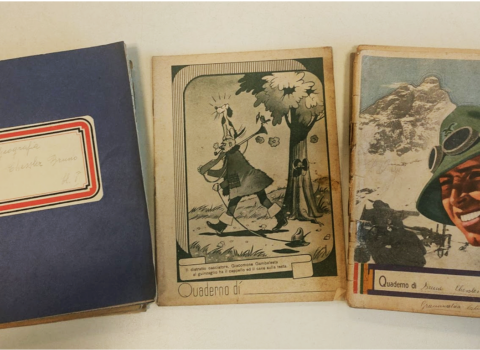 October 11, 2023EducationAlso Kessler went to school, but what do we know about his education? Receiving education for him was not easy for sure and perhaps this is the reason why he later on put a lot of his attention on culture and education
October 11, 2023EducationAlso Kessler went to school, but what do we know about his education? Receiving education for him was not easy for sure and perhaps this is the reason why he later on put a lot of his attention on culture and education -
 September 20, 2023Book of the month. A cycle of events to ponder over history through the written pageA series of events entitled "Book of the month", organized by the Italian-German Historical Institute in cooperation with the Foundation's Library, will be starting on Sept. 28, at Fondazione Bruno Kessler's location in via Santa Croce 77.
September 20, 2023Book of the month. A cycle of events to ponder over history through the written pageA series of events entitled "Book of the month", organized by the Italian-German Historical Institute in cooperation with the Foundation's Library, will be starting on Sept. 28, at Fondazione Bruno Kessler's location in via Santa Croce 77. -
 July 26, 2023Holiday timeKessler's correspondence consists not only of long letters about politics, but also of greeting cards, telegrams and postcards
July 26, 2023Holiday timeKessler's correspondence consists not only of long letters about politics, but also of greeting cards, telegrams and postcards -
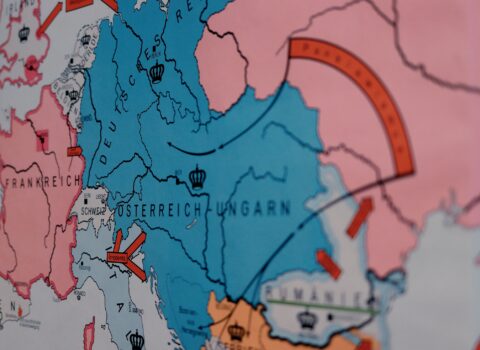 July 6, 2023Fifty years agoIn the 1973 provincial budget, we find the first small steps of the Italian-German Historical Institute, the oldest research institute in what is now Fondazione Bruno Kessler
July 6, 2023Fifty years agoIn the 1973 provincial budget, we find the first small steps of the Italian-German Historical Institute, the oldest research institute in what is now Fondazione Bruno Kessler -
 July 3, 2023Abortion: cultural, political, medical choices comparedA contemporary analysis of the (non) right to abortion in Italy, Europe and the world from politics to law and medicine.
July 3, 2023Abortion: cultural, political, medical choices comparedA contemporary analysis of the (non) right to abortion in Italy, Europe and the world from politics to law and medicine. -
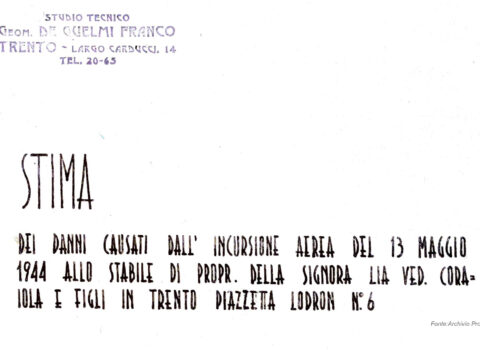 April 6, 2023Trentino bombingsThere is little trace in Kessler's papers of the early part of his life, which remains in the background of an important political career: however, some of the experience of the bombings in World War II remains.
April 6, 2023Trentino bombingsThere is little trace in Kessler's papers of the early part of his life, which remains in the background of an important political career: however, some of the experience of the bombings in World War II remains. -
 March 23, 2023The Kessler Era. Considerations on the sidelines of a research study2024 will mark the 100th anniversary of Bruno Kessler's birth. A research project aims to delve into his political story.
March 23, 2023The Kessler Era. Considerations on the sidelines of a research study2024 will mark the 100th anniversary of Bruno Kessler's birth. A research project aims to delve into his political story. -
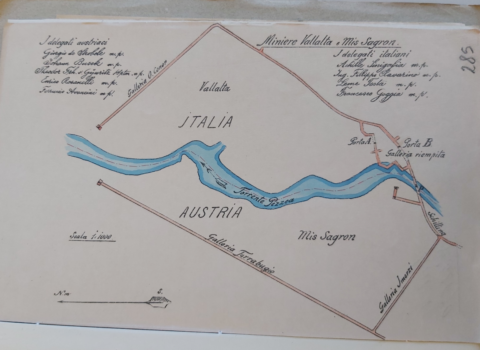 March 20, 2023Archives and research: the conclusion of the Grenzakten 2.0 projectArchival study and the evolving concept of borders at the heart of the Grenzakten 2.0 project, thanks to which the large documentary collection on the borders of modern Europe preserved in the two State Archives of Innsbruck and Trento is now accessible.
March 20, 2023Archives and research: the conclusion of the Grenzakten 2.0 projectArchival study and the evolving concept of borders at the heart of the Grenzakten 2.0 project, thanks to which the large documentary collection on the borders of modern Europe preserved in the two State Archives of Innsbruck and Trento is now accessible. -
 February 14, 2023History changesMassimo Rospocher is the new director of the Italian-German Historical Institute FBK. We asked him about his plans for the coming years, how history is changing and how his own history has changed.
February 14, 2023History changesMassimo Rospocher is the new director of the Italian-German Historical Institute FBK. We asked him about his plans for the coming years, how history is changing and how his own history has changed. -
 January 27, 2023Let’s start at the end: the footage of Kessler’s funeralThanks to a VHS, we can review the original 1991 footage, which allows us to reflect on the fact that the images we see are always the product of someone's choice.
January 27, 2023Let’s start at the end: the footage of Kessler’s funeralThanks to a VHS, we can review the original 1991 footage, which allows us to reflect on the fact that the images we see are always the product of someone's choice. -
 December 29, 2022A journey through Bruno Kessler’s papersWith a new research project, we also begin a journey through the papers of Bruno Kessler, in the company of historian Camilla Tenaglia, from FBK-ISIG (Italian-German Historical Institute)
December 29, 2022A journey through Bruno Kessler’s papersWith a new research project, we also begin a journey through the papers of Bruno Kessler, in the company of historian Camilla Tenaglia, from FBK-ISIG (Italian-German Historical Institute) -
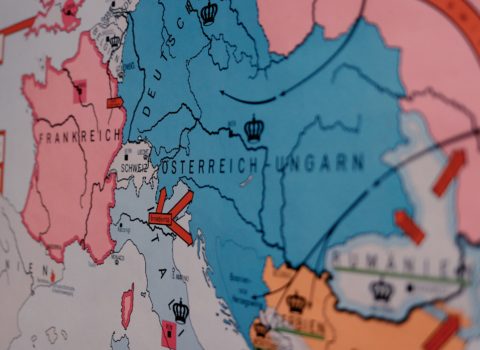 October 13, 2022Between historiography and the public use of historyThe "ARO" forum devoted to the history of the German Empire provides an opportunity to reflect on the relationship between historiography and public memory
October 13, 2022Between historiography and the public use of historyThe "ARO" forum devoted to the history of the German Empire provides an opportunity to reflect on the relationship between historiography and public memory -
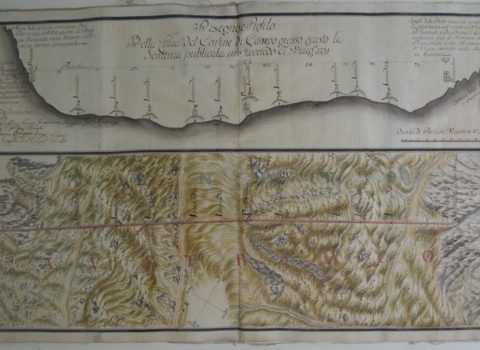 June 8, 2022GRENZAKTEN 2.0: an investigation into the deeds relating to the borders kept in Trento and InnsbruckISIG historian Katia Occhi recounts the articulated project dedicated to documents on borders created between 1400 and 1800
June 8, 2022GRENZAKTEN 2.0: an investigation into the deeds relating to the borders kept in Trento and InnsbruckISIG historian Katia Occhi recounts the articulated project dedicated to documents on borders created between 1400 and 1800 -
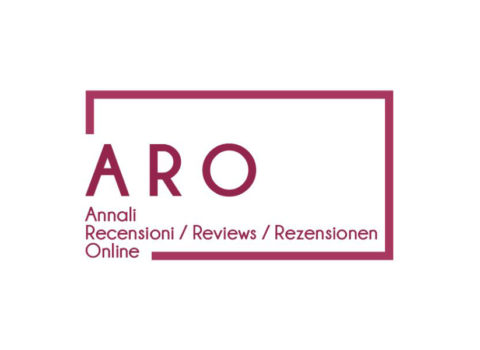 May 31, 2022Writing history, writing storiesThe "Aro" Forum dedicated to "Veronica and the Devil" is an opportunity to reflect on the writing of history
May 31, 2022Writing history, writing storiesThe "Aro" Forum dedicated to "Veronica and the Devil" is an opportunity to reflect on the writing of history -
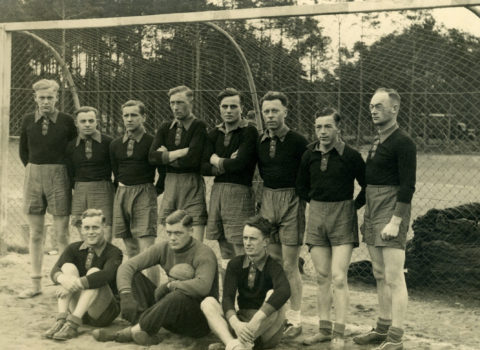 May 23, 2022The geopolitics of soccerBarring resounding twists and turns, Italy will not be at the World Cup to be played in Qatar between November and December. Those who struggle to cope with watching a World Cup orphaned by their national team can make up for it by diving deeper into the study of the history of the World Cup, to which historical research has in recent times devoted some attention.
May 23, 2022The geopolitics of soccerBarring resounding twists and turns, Italy will not be at the World Cup to be played in Qatar between November and December. Those who struggle to cope with watching a World Cup orphaned by their national team can make up for it by diving deeper into the study of the history of the World Cup, to which historical research has in recent times devoted some attention. -
 May 13, 2022The visit of the German Ambassador Viktor Elbling to FBKViktor Elbling, Ambassador of the Federal Republic of Germany in Italy, visited the Bruno Kessler Foundation in Trento, accompanied by the Honorary Consul of the German Federal Republic for the Trentino-Alto Adige Region, the lawyer Gerhard Brandstätter. They were welcomed by Francesco Profumo, the President of the Foundation, the Secretary General Andrea Simoni and the Director of the Italian-German Historical Institute (FBK-ISIG) Christoph Cornelißen
May 13, 2022The visit of the German Ambassador Viktor Elbling to FBKViktor Elbling, Ambassador of the Federal Republic of Germany in Italy, visited the Bruno Kessler Foundation in Trento, accompanied by the Honorary Consul of the German Federal Republic for the Trentino-Alto Adige Region, the lawyer Gerhard Brandstätter. They were welcomed by Francesco Profumo, the President of the Foundation, the Secretary General Andrea Simoni and the Director of the Italian-German Historical Institute (FBK-ISIG) Christoph Cornelißen -
 May 11, 2022One school, many schoolsThe school model we have experienced is not the only one possible. A journey into the school universe with the historians Enrico Valseriati and Vanessa Roghi.
May 11, 2022One school, many schoolsThe school model we have experienced is not the only one possible. A journey into the school universe with the historians Enrico Valseriati and Vanessa Roghi. -
 March 28, 2022Cryptography: a millennia-long historyWhat trends for the future of Cybersecurity? An introductory lesson with Prof. Silvio Ranise, director of the Fondazione Bruno Kessler's Cybersecurity Center
March 28, 2022Cryptography: a millennia-long historyWhat trends for the future of Cybersecurity? An introductory lesson with Prof. Silvio Ranise, director of the Fondazione Bruno Kessler's Cybersecurity Center -
 February 10, 2022The journal “Annali.Recensioni.Online” (ARO) goes electronicThe purpose is promoting a wider circulation of historical research and historiographical innovations
February 10, 2022The journal “Annali.Recensioni.Online” (ARO) goes electronicThe purpose is promoting a wider circulation of historical research and historiographical innovations -
 October 28, 2021Who invented Halloween?Before the Catholic feast of All Saints (November 1) there is that of Halloween (October 31), which is increasingly present in Italian families. But are they really two separate occasions? By carefully marching back through the centuries, we can find the arguments to build our answer to this question.
October 28, 2021Who invented Halloween?Before the Catholic feast of All Saints (November 1) there is that of Halloween (October 31), which is increasingly present in Italian families. But are they really two separate occasions? By carefully marching back through the centuries, we can find the arguments to build our answer to this question. -
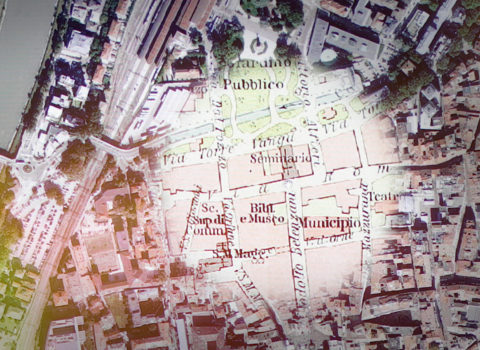 June 15, 2021More maps for everyoneThe "Trento Time Travel Maps" project of the FBK Digital Society Center provides citizens with a series of urban maps to understand how the city has changed from the 19th century to today
June 15, 2021More maps for everyoneThe "Trento Time Travel Maps" project of the FBK Digital Society Center provides citizens with a series of urban maps to understand how the city has changed from the 19th century to today -
 March 30, 2021PAST TO PRESENT: rediscovering history through augmented realityChiese Valley in Trentino combines tradition and innovation to rediscover the history of Fort Larino and the Great War
March 30, 2021PAST TO PRESENT: rediscovering history through augmented realityChiese Valley in Trentino combines tradition and innovation to rediscover the history of Fort Larino and the Great War -
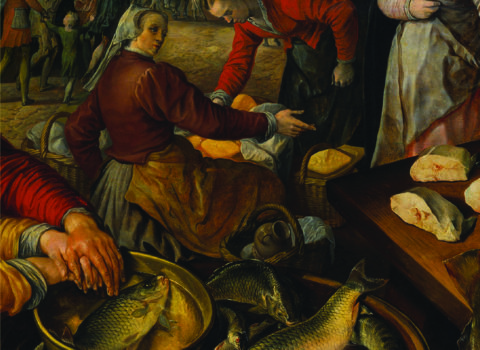 March 25, 2021Fasting is not anymore what it used to beWe are in Lent, the forty-day period preceding Easter which according to Catholic norms should be characterized by fasting and abstinence. Often the two terms are used interchangeably, but it is wrong to do so.
March 25, 2021Fasting is not anymore what it used to beWe are in Lent, the forty-day period preceding Easter which according to Catholic norms should be characterized by fasting and abstinence. Often the two terms are used interchangeably, but it is wrong to do so. -
 October 26, 2020TOTEM – 4D Trento Time MachineICT technologies, archive data, space-time analyses of the urban area, apps and Artificial Intelligence to enhance Trento, its history and its archives
October 26, 2020TOTEM – 4D Trento Time MachineICT technologies, archive data, space-time analyses of the urban area, apps and Artificial Intelligence to enhance Trento, its history and its archives -
June 18, 2020Study Week FBK – ISIG (Italian-German Historical Institute) 2020The health emergency forces us to postpone the awaited event entitled "Environment and infrastructures from the early modern period to the present: challenges, knowledge and innovation" to next year.
-
 March 10, 2020Of plague and passionTogether with Enrico Piergiacomi, we reconstruct a history of the relationship between emotion and reaction to epidemics / pandemics
March 10, 2020Of plague and passionTogether with Enrico Piergiacomi, we reconstruct a history of the relationship between emotion and reaction to epidemics / pandemics -
July 8, 2019When the media make historyThe ISIG 2019 summer school has involved modern and contemporary history scholars in an intense debate on ongoing research projects and scientific investigation methods
-
May 28, 2019Stories of EuropeA discussion from different perspectives starting from the critical reading of the books "L'Europa che fu" by Pietro Rossi, "European Modernity" by Bo Stråth and Peter Wagner, and finally, "Projekt Europa" by Kiran Klaus Patel entrusted to Edward Tortarolo, Christoph Cornelißen and Gabriele D'Ottavio
-
May 26, 2017Race and TheologyA VIDEO-message from prof. Leo D. Lefebure on "The Conflict of Social Innovations: Christian Theologies, Empires, and Modern Constructions of Race"
-
December 23, 2016Mobility story: Claudio FerlanI met Claudio Ferlan and asked him to take a few minutes of his time to share his experience of Mobility abroad.
-
October 28, 2016The Protestant Reformation in the context of global historyThe conference "The Protestant Reformation in the context of global history" being hosted at Trento-based Fondazione Bruno Kessler wraps up tomorrow. Religious reforms and civilizations".
-
October 26, 2016The Leggimontagna 2016 Prize awarded to Marco MondiniLeggimontagna 2016 assigned the 3rd place to "Andare per i luoghi della Grande Guerra" by Marco Mondini (Il Mulino).
-
September 5, 2016The book by Giovanni Bernardini on the De Gasperi-Gruber Accord. An international piece of history, is outThe volume, part of the FBK Press series, recounts the international significance of the Agreement, which helped make it a highly advanced legal document for its time in the protection of ethnic and linguistic minorities